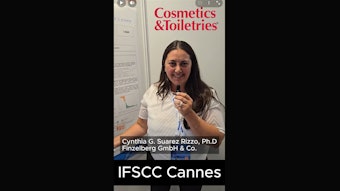
With countless products entering the market every year, the personal care industry sees many trends come and go. It can be difficult for formulators to predict which ones will have an investment-worthy influence on the market vs. a moment in the sun that quickly fades.
Trends toward sustainability and plant-based, naturally derived ingredients are proving to be anything but the latter. They’ve created many new markets within the personal care space, with a thriving following of health-conscious consumers who value not only the removal of artificial ingredients, but the careful selection of alternatives that are clean and effective.
Zemea® propanediol, produced by the DuPont Tate & Lyle global headquarters in Loudon, Tennessee, USA, can help formulators find solutions that balance both sides of this equation. Produced through the fermentation of corn starch, it’s 100% plant-based. Its performance benefits include high purity, lack of skin irritation or sensitization, improved humectancy and excellent sensory characteristics.
When consumers look for clean, sustainable hair care products, the variety of options they are presented with could mean that “clean” may no longer be enough to sway their decision. Formulators of shampoos, conditioners, styling products and hair colorants should consider the versatile performance aspects of Zemea® propanediol.
Technical studies have shown its performance benefits to include excellent moisturization, lack of skin irritation, improved sensory properties in application (including wet and dry stages in shampoos) and its potential for boosting zinc pyrithione efficacy in dandruff shampoos. Formulators rely on Zemea® propanediol to meet consumer demand for plant-based, innovative hair care products with improved sensory and safety profiles.
Zemea® propanediol is also ideally suited for many different skin and body care applications that are gentle on the skin, but also maintain effective performance aspects. This includes moisturizers, cleansers, sunscreen, deodorant, sensitive skin products, and hand sanitizer. Zemea® propanediol can even support products that are skin-friendly enough to cleanse compromised skin.
In multiple studies using the modified Draize Repeated Insult Patch Test method, Zemea® propanediol produced no skin irritation, fatigue or sensitization—even at high concentrations.1 Researchers observed no clinically significant dermal irritation or allergic contact following exposure of up to 75% Zemea® propanediol at three different pH levels. By contrast, skin irritation was observed with propylene glycol (PG) at a concentration of 25%, with nearly one-quarter of the test population indicating positive irritation at a 75% concentration. Results from these studies show that Zemea® propanediol has low potential to irritate or sensitize human skin.
Zemea® propanediol produces 47% less greenhouse gas emissions and consumes 49% less nonrenewable energy than petroleum-based 1,3-propanediol. Compared with PG, Zemea® propanediol produces 42% less greenhouse gas emissions and uses 41% less nonrenewable energy from cradle-to-gate. Zemea® propanediol is certified 100% bio-based under the USDA’s BioPreferred® Program and is the world’s first 100% bio-based glycol alternative to have earned certification from the Natural Products Association.
Formulators who are interested in using Zemea® propanediol in personal care products are encouraged to contact DuPont Tate & Lyle to request a sample.
Disclaimer:
The above paid-for content was produced by and posted on behalf of the Sponsor. Content provided is generated solely by the Sponsor or its affiliates, and it is the Sponsor’s responsibility for the accuracy, completeness and validity of all information included. Cosmetics & Toiletries takes steps to ensure that you will not confuse sponsored content with content produced by Cosmetics & Toiletries and governed by its editorial policy.










